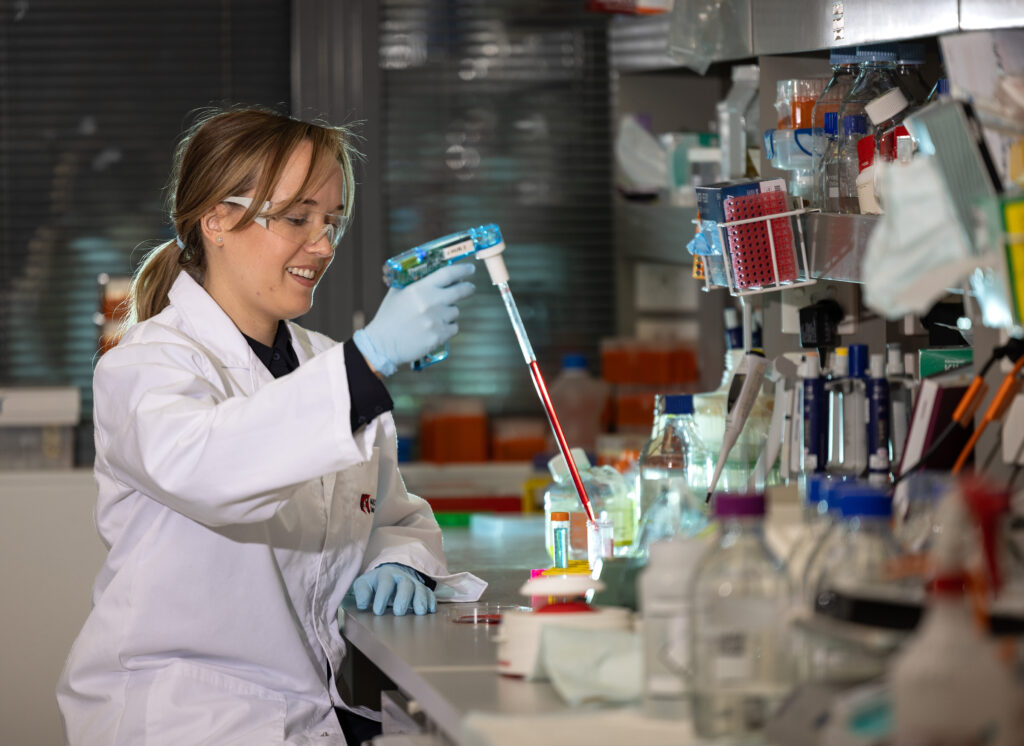How curiosity led Dr Jennilee Davidson to a thriving research career

Curiosity, passion, and a deep commitment to discovery are essential in the world of scientific research. Especially, when it comes to studying complex diseases like motor neurone disease (MND), also known as ALS. For Dr. Jennilee Davidson, her fascination with the nervous system sparked a journey that began with undergraduate studies in Canada and has now led to a Research Fellowship at Sydney’s Macquarie University.
Dr Davidson is currently completing research into a gene therapy designed to target harmful forms of the TDP-43 protein in motor neurons. For her work, Dr Davidson was awarded an ALS Scholars in Therapeutics fellowship in 2024. This fellowship is delivered in partnership by Sean M. Healey and AMG Center for ALS at Massachusetts General Hospital, ALS Finding a Cure and FightMND. It is designed to engage clinician-scientists and post-doctoral fellows to gain training and experience in therapy development for ALS/MND at their home institution with optional industry experience.
In celebration of the 10th International Day of Women and Girls in Science, we sat down with Dr. Davidson to talk about her path to MND research and the passion that drives her scientific journey.
Can you tell us about your research career so far?
My career in research has largely been driven by my curiosity of how our nervous system works. I completed an Honours degree in neuropeptide signalling at Canada’s Queen’s University and a Master’s in neurodevelopment at York University in Canada. I later earned my PhD in neurodegeneration at Macquarie University.
My first passion was the ‘basic sciences’ with most of my research focused on discovering fundamental intracellular mechanisms, like protein interactions and biochemical regulation of cellular signalling pathways, being supported in part by the National Science and Engineering Research Council of Canada. This provided a solid foundation for understanding how MND-linked genetic mutations can functionally dysregulate these mechanisms to contribute to neurodegeneration in my PhD.
During my PhD and into my post-doc, I worked on developing a new gene therapy for MND. This therapy was patented and licensed to a spin-out company. The project was a team effort led by Professor Roger Chung and Associate Professor Albert Lee at Macquarie University, both of whom have been amazing mentors to me. Working on a project focused on potential treatments inspired me to pursue a Macquarie University Research Fellowship and other opportunities to move research from the lab into real-world applications, always with the goal of helping people.
Being named an international ALS Scholar in Therapeutics with the Sean M. Healey and AMG Center for ALS at Massachusetts General Hospital, in partnership with FightMND and ALS Finding a Cure, has been a major highlight of my career. It’s been a great opportunity to receive real-time feedback from top MND experts, collaborate internationally and learn from leaders in biotech and MND research. Associate Professor Ghazaleh Sadri-Vakili from Mass General has also been an invaluable mentor throughout this experience.
Why did you decide to pursue research into MND?
The people. The community of people with lived experiences of MND, dedicated researchers and clinicians, and supporters of MND research really makes a difference. Our ability to develop and test potential therapeutics on samples donated to the biobank makes our research much more meaningful and relevant.
When I share with people that I research MND, they in turn share stories about how their lives have been affected directly or indirectly by MND. This gives me extra purpose to the research I do every day.
You mentioned that you’re a recipient of an ALS Scholars in Therapeutics fellowship. What does this scholarship mean to you?
The significance of this funding in helping me progress my project is invaluable. It is a very unique global partnership opportunity that is specifically aimed at helping me develop new therapeutic treatments with the support of my mentors from Macquarie University as well as mentors from around the world.
This was my first grant from FightMND and I was so excited to receive the news. To be part of this international and Australian community was a huge success. I’m excited to continue my journey in this research.
Is there anything you would tell young women who are considering a career in scientific research?
It’s a fulfilling career!
Scientific research is becoming increasingly multi-disciplinary, and the skillsets you build will be invaluable throughout your career. Upskill by trying different types of research/skills that align with your interests. Seek out mentorship from different types of mentors at different career stages to maximise the breadth. Actively asking teachers, tutors, lecturers about gaining scientific research experience can lead to some amazing opportunities.
We’re all in this together. Help us in the fight
Dr Davidson, along with MND researchers across Australia and around the world are continuing to further their research in the lab to ultimately get it into clinical trials. While we have made significant progress, research is expensive and takes time. Your continued support helps us to continue to invest in vital research that will lead into effective treatments, and one day a cure, for MND. Together, we can beat the Beast.